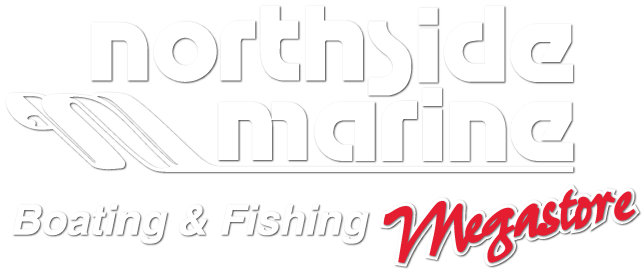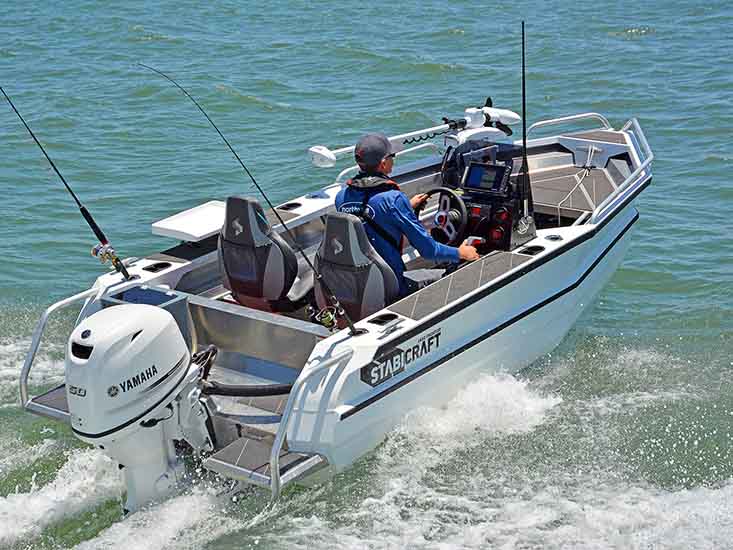As the smallest model in New Zealand’s Stabicraft range of aluminium pontoon runabouts, the 1450 Frontier is available as a tiller-steer open boat, an entry-level side-console model called the Sportfish, as well as a feature-packed Profish version.
The subject of this review is the deluxe model paired with a 50hp Yamaha four-stroke outboard. While the hull is rated for longshaft outboards between 30hp and 50hp, it performs well with the maximum power.
During our test we recorded a top speed of 28.6 knots (53km/h), which is decently quick for a small boat. There was ample power through the low- and mid-range for the little Stabicraft to feel nimble and fast underway.
The boat is most economical cruising at 21 knots (39km/h) with the engine bustling along at 4500rpm. At this rpm the Yamaha burns around 10lt/h.
SMOOTH AND STABLE

In the 1450 Frontier, the hull vee angle isn’t as sharp as in the larger boats, but for its small size this hull is pretty comfortable in chop and softer than a regular vee-bottom planing hull.
The Stabicraft is also much more stable than a traditional hull, being more akin to a square-bow punt or a barge when at rest. It’s very solid and secure, allowing anglers to move about the interior without fear of upsetting the trim.
The mechanical steering was excellent, helping to make the boat manoeuvrable at speed and agile through the corners. It sits flat through turns.
FISHING FEATURES

The 1450 Frontier Profish is nicely set up for fishing sheltered and coastal waterways. There is a welded casting deck that doubles as a bow seat and wraps back toward the stern on each side to create side seats.
Anglers can stand on these side seats as they’re surfaced with grippy U-Dek foam rubber, as is the floor. There is provision for the anchor and rode in the space beneath the front deck, alongside a welded tray that contains the battery to run the optional port-side Minn Kota electric trolling motor.
The rear cockpit area is not as spacious as the front fishing deck, but the freeboard is higher (690mm) so you can lean against the side and rear coamings in choppy conditions.
HELM STATION

Standard Frontier Profish models come with a single Skipper helm seat abaft the starboard-side console. Our test boat was optioned with two deluxe Fish Pro seats – the passenger’s is omitted from standard models to open up the full length of the port-side cockpit for fishing and enhance access to the optional livebait tank in the transom corner.
The helm station is compact but practical. Being welded to the side deck, it doesn’t require bracing and creates extra leg room for the skipper. There is space on the console for engine gauges, a VHF radio and a bracket-mounted electronics display. The console is topped by a short yet effective tinted acrylic windshield.
Other features include extra-wide side coamings with side storage pockets, welded cleats, multiple flush rodholders and cupholders, a removable baitboard and rear boarding platforms. Also included with the Profish model is a 70lt Icey-Tek cooler with a cushioned lid.
ADVENTURE BOUND

The little Stabicraft is equally at home fishing urban coastal waters as adventuring in remote/outback locations Australia-wide. The hull is exceptionally strong, the ride and handling excellent, and the interior layout versatile.
The Profish model is considerably more expensive than a regular pressed aluminium boat but it’s more capable and entirely unique; it doesn’t really compare with any other alloy boat in this size range.
STABICRAFT 1450 FRONTIER PROFISH PRICE
Prices correct as of March 2023
- Price from: $47,695
- Price as tested: $63,243
STABICRAFT 1450 FRONTIER PROFISH SPECIFICATIONS
- LOA: 4.42m
- Beam: 1.89m
- Hull weight: 290kg
- Towing weight (approx): 720kg
- Fuel capacity: 25lt (portables)
- Power (as tested): 50hp Yamaha four-stroke

